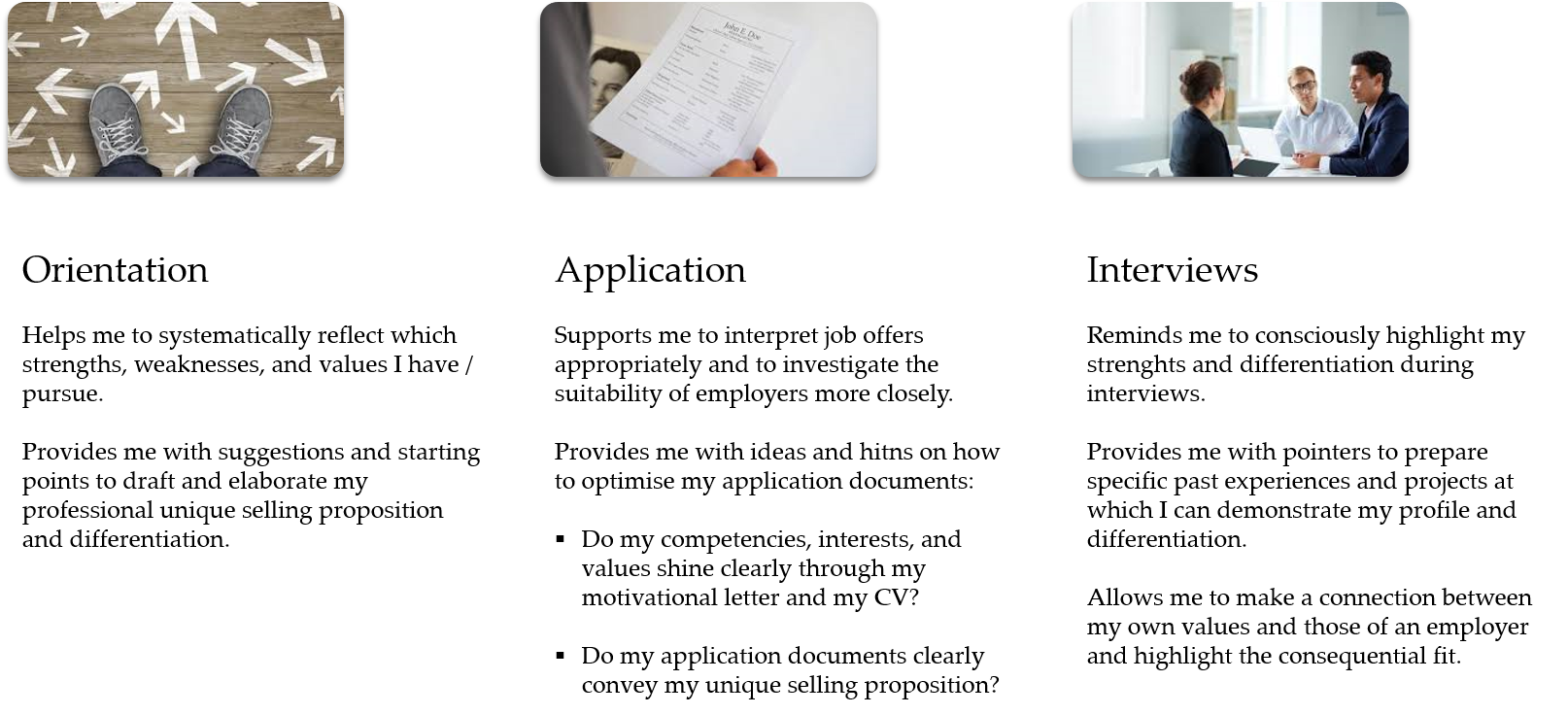Thank you for participating in the Career Profiler Survey. On this page, you can find out more about the aims of our study, how to use the results of the survey, and how to interpret the evaluation report. The most important thing first: In considering your professional career, the Career Profiler evaluation is not the goal – it is the starting point.
Interpretation support
Evaluation report structure
Interpreting the evaluation
Typical profile types
Study design
Three key dimensions: interests, skills, and values
Concepts behind the dimensions
Your Three Main Benefits
The greatest benefit of the Career Profiler is hidden behind the obvious: The survey questions provide a guiderail along which you can systematically review your career preferences. As you work through the survey, you will be faced with a series of decisions: Am I more interested in Topic A or B? Do I prefer one activity to another? Of two characteristics of a corporate culture, which is more important to me? We believe that your professional career plan must first and foremost suit you, which is why we encourage you to examine and challenge your preferences.
Another great benefit for students is that you will receive a personal evaluation report after participating in the survey (see sample report). Based on the information you provide, this report will present the results in three different ways – along with a comparison group. The graphs and comparison data will allow you to study a summary of the information provided by you systematically and from different perspectives. While you are reviewing these findings, try to stay detached and objective: The Career Profiler is not meant to provide ready-made answers but rather a basis for structured reflection. Some results will seem more relatable to you than others. If this is the case: Consider the differences you perceive and draw your own conclusions. Once you have studied the evaluation report in this manner, you will be in a much better position to answer key questions about your unique selling points as a professional. This will enable to design job applications that highlight your strengths and to apply for and choose the jobs that are right for you.
Finally, you can actively use the findings from the evaluation report when planning your next professional step. To do this, follow the three steps below:
- Use the mean value lines and the comparison data in the evaluation report to see how the information you have provided differs from that provided by your potential competitors.
- The profiles based on your interests, skills and values allow you to systematically determine what employers and what job advertisements are suitable for you.
- If you want to apply for a specific position, you can use the profiles based on your interests, skills, and values directly to highlight your suitability in your application letter, on the phone, and in personal interviews.

What the Career Profiler is Not
In your search for answers to help you on your career path, the Career Profiler does not provide conclusive, irrefutable results. Rather, the Career Profiler is a tool to support systematic reflection. It will offer you food for thought on how you want to position yourself professionally.
The Career Profiler does not tell you whether a profile of interests, skills, and values is “right” or “wrong”. No profile is “right” or “wrong”. It is always based on your self description. No matter what your profile looks like: Your next thought should always be: "How do I use this profile for my career path?" and not “How do I change my profile to fit my career path?” Our position is that a professional career should suit you, not the other way around.
The Career Profiler never has the last word. Your preferences change. If you do this survey again in a year's time, your profile will probably have changed slightly due to new findings, experiences, and attitudes. Preferences in terms of professional self-actualization are subject to change. Always see the knowledge gained as a snapshot of your current situation. You have the final say.
The Career Profiler is not a purely psychometric tool but an applied project that operationalizes scientific findings. It aims to put the, sometimes conflicting, demands of several academic career goals into a meaningful relationship to each other. It is therefore a central pillar of a realistic educational, procedural-advisory, and measurement-based concept.